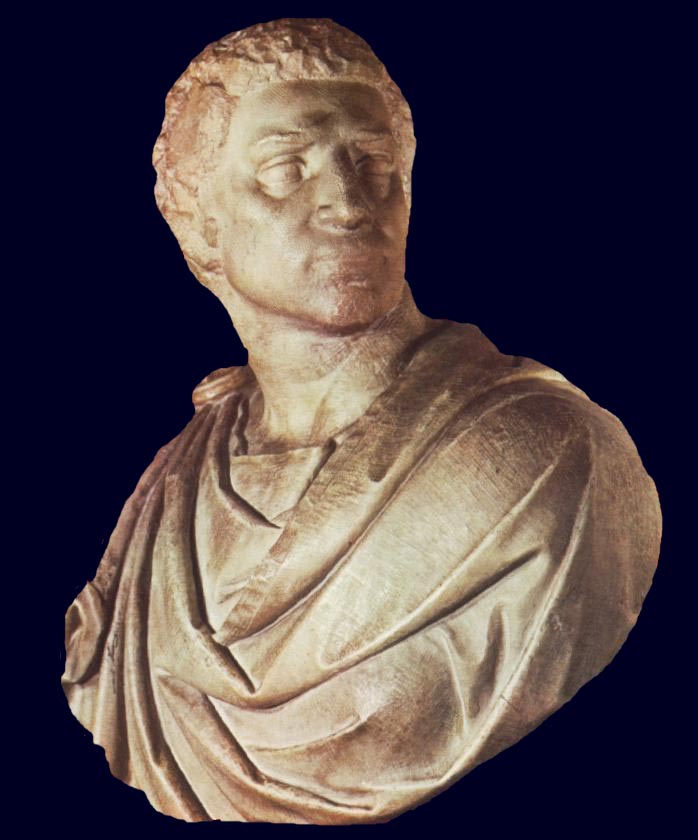 Having spent the last two years researching and writing a novel set in the Roman world, I've naturally spent a great deal of time thinking about Julius Caesar. So it's no surprise that, of the many projects I've been noodling, the first one finished is a play starring Caesar and Brutus the night before the Ides.
Having spent the last two years researching and writing a novel set in the Roman world, I've naturally spent a great deal of time thinking about Julius Caesar. So it's no surprise that, of the many projects I've been noodling, the first one finished is a play starring Caesar and Brutus the night before the Ides.
Of course, my background is all Shakespearean, so my take on them is informed by Shakespeare's THE LIFE AND DEATH OF JULIUS CAESAR, which is a thoroughly deceptive title – the play has nothing to do with Caesar's life, and all to do with his death. For a title character he has very little stage time – five scenes in all, I think, including his ghostly appearance – and is dead halfway through the play. The play belongs to Brutus – but it's still all about Caesar.
It's taken me awhile to see that. As a huge fan of all things Roman, and a devotee of Colleen McCullough's marvelous MASTERS OF ROME novels, I love Caesar and I rail against the play because it doesn't do the man justice. Shakespeare portrays him as a self-important shell – deaf in one ear, prone to fits, suspicious, and constantly referring to himself in the third person. A formerly great man gone to seed, clinging to his reputation and dignity.
But the play is all about Caesar nevertheless. It's about the way the man's life, and especially death, changed the course of the world. Caesar permeates every scene, and Shakespeare assumes we'll get all the references – who doesn't know the story of Cato's suicide, or that Antony was jealous of Octavius for inheriting Caesar's wealth? It's our own fault that we don't pay attention to history anymore, and Shakespeare doesn't want to waste time telling us things we should know. His focus is on the ramifications of the great man's death, and who better to be our guide than the man that murdered him?
 It's only recently that I've started thinking how very subversive the play's choice of protagonist is. For over 1600 years, Brutus was the villain. Dante puts him in Satan's mouth alongside Judas (and Cassius), the greatest betrayers of mankind being eternally devoured by the betrayer of God. Boccacio and Chaucer don't go quite so far, but they certainly exalt Caesar and condemn Brutus.
It's only recently that I've started thinking how very subversive the play's choice of protagonist is. For over 1600 years, Brutus was the villain. Dante puts him in Satan's mouth alongside Judas (and Cassius), the greatest betrayers of mankind being eternally devoured by the betrayer of God. Boccacio and Chaucer don't go quite so far, but they certainly exalt Caesar and condemn Brutus.
So Shakespeare takes the villain and makes him a hero. It reminds me of the modern play The Trial of Judas Iscariot, where they explore Judas' possible motives for betraying Christ. Shakespeare single-handedly rehabilitated Brutus, and despite Antony's rising sarcasm in his claim that "Brutus is an honorable man," Shakespeare's Brutus is just that.
The great flaw, to me, has always been the lack of interaction between Caesar and Brutus. For men with such a tangled personal and political history, the play is remarkably silent regarding their past.
Oddly, Caesar's character is better explored through a different playwright – George Bernard Shaw. His CAESAR AND CLEOPATRA shows Caesar four years before the assassination, and while he complains of his age, Shaw presents an excellent version of the great man – his humor, his confidence, his arrogance, his wit, his philosophy, and his utter practicality. Also the fact that he was balding, and embarrassed by it, and that he didn't like rich foods or wine. But most of all, Shaw presents his clemency. In this play it's Caesar who is the dreamer, and like Brutus he is disappointed in everyone around him. But unlike Brutus, he is not disappointed in himself.
The relationship between Caesar and Cleopatra in the play is platonic – very strange, considering she bore him a child and followed him to Rome to show the boy off.
I'm sure I'll talk at more length about the play I've written – we had a first reading last week, just so I could hear it, and I must thank Rob Kauzlaric, Dave Skvarla, Kevin Theis, Maggie Kettering, Ron Keaton, Edwin Unger, and my darling Jan for helping me find the strengths and flaws in the script. But cogitating about Caesar, it's fast becoming my wish to find a theatre company somewhere and settle in to doing THE ROMANS, using the same cast to produce Shaw's CAESAR AND CLEOPATRA and Shakespeare's JULIUS CAESAR and ANTONY AND CLEOPATRA, with my own play stuck in the middle. I'm sure this idea isn't new – in 1951, for example, Olivier and Leigh played the leads in back-to-back productions of C&C and A&C (which must have been weird, I think, having him switch from Caesar to Antony). But I'd still like to try it, and use a year in the theatre to explore the fall of the Roman Republic and the rise of the Roman Empire. An apt and timely subject, I think, looking at the world around us…


I wrote a thesis on the way cinematic adaptations about the Roman Empire have recently changed to accommodate the current climate. It used to be easy to glorify the underdogs who stood against Rome and vilify the powerful figures. Now that tune is changing, but with American sympathies still tied to the underdog figure, suddenly things are coming out depicting Octavius, Nero, etc. in absurd lights to make them seem like underdog heroes who won. Brutus is rarely dwelt on because he didn’t end up powerful enough to link with the modern U.S., so he serves as a villain who makes Octavius’ easier to relate to. Just thought I’d mention this trend I’ve noticed in case you’re interested. 🙂
VERY interested. It’s amazing, isn’t it? And I hadn’t even considered the evolving nature of the depiction of Rome. We’ve come a long way since SPARTACUS. Now it’s time to emulate Augustus. Though, to me, Antony is the most American of all the Romans… Thanks for posting! I’ll be thinking about this for awhile.
Have you approached the Ashland Shakespeare festival with your idea? They would be a perfect venue as they do both Shakespeare and contemporary plays.